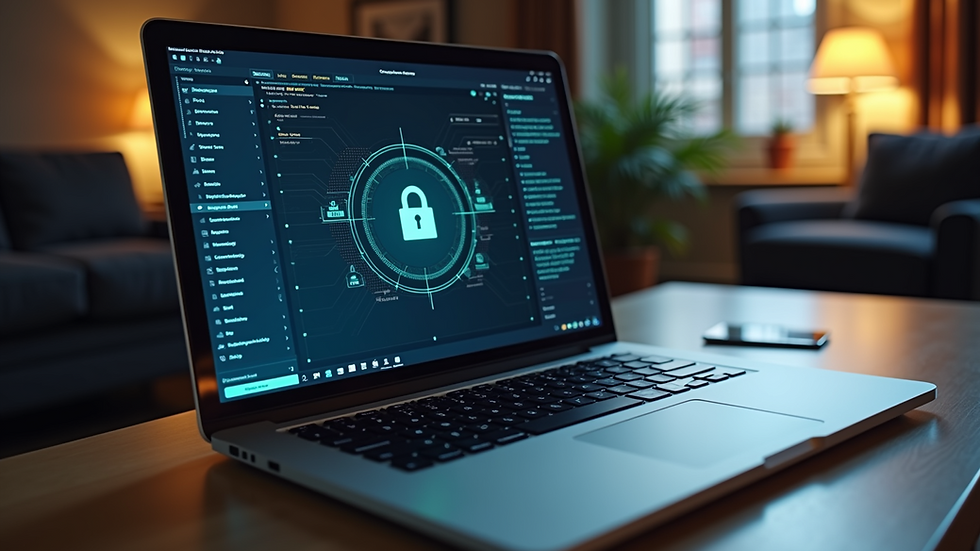Mastering Cyber Safety: Tips for a Secure Online Experience
- Cyndi Rose

- Jul 8
- 4 min read
In today's digital world, ensuring your online security is more important than ever. With increasing cyber threats, mastering the art of staying safe online is crucial. This guide offers practical online security tips that can help protect you and your personal information against various cyber threats.
Online Security Tips
As we navigate the vast online landscape, it's essential to adopt a proactive approach to ensure our digital safety. Here are some essential tips you can incorporate into your routine:
Use Strong Passwords: Create unique passwords for each of your online accounts. A strong password should be at least 12 characters long and combine upper and lower-case letters, numbers, and special symbols. Consider using a password manager to help keep track of your passwords securely.
Enable Two-Factor Authentication (2FA): Whenever possible, activate 2FA for your accounts. This adds an extra layer of security by requiring a second form of verification, such as a text message code, in addition to your password.
Stay Updated: Regularly update your software, whether that's your operating system, browsers, or apps. Updates often include security patches that can protect you from recently discovered vulnerabilities.
Be Wary of Public Wi-Fi: Using public Wi-Fi networks can expose you to risks. Avoid accessing sensitive accounts or conducting financial transactions unless you're using a Virtual Private Network (VPN) to encrypt your connection.
Educate Yourself About Phishing Scams: Cybercriminals often use deceptive emails or messages to trick you into revealing personal information. Always verify the sender's email address and avoid clicking on suspicious links.

What are the 5 C's of Cyber Security?
Understanding the foundations of cyber security can significantly enhance your protective measures. The 5 principles’s of cyber security are critical principles that everyone should know:
Confidentiality: This ensures that sensitive information is only accessible to authorized individuals. Encrypt sensitive data and use secure communication methods to ensure confidentiality.
Integrity: Data integrity means that information must be kept accurate and consistent. Regularly check for signs of unauthorized access or alterations in your files.
Availability: This principle emphasises that authorized users must have access to information when needed. Strategies such as data backups and disaster recovery plans can help ensure availability.
Compliance: Many industries have strict regulations requiring data protection protocols. Ensure that your practices comply with standards relevant to your field to avoid legal troubles.
Cyber Safety: Maintain awareness of emerging threats and stay informed about best practices for protecting your online identity and data. Implement measures to strengthen your defenses continuously.

Best Practices for Secure Browsing
Secure browsing is another essential component of maintaining a safe online experience. Consider these practices for safer internet use:
Use HTTPS Sites: Ensure the URLs you visit begin with "https" rather than "http." The addition of 's' signifies that the website has a layer of encryption, making it more secure.
Clear Your Browser History and Cookies Regularly: Doing this can help protect your privacy. Clearing your cache and cookies can prevent advertisers from tracking your browsing habits.
Install an Ad Blocker: Advertisements can sometimes lead to malware. By using an ad blocker, you can avoid potentially harmful ads that can compromise your security.
Be Cautious About Downloading Files: Only download files from trusted sources. Before downloading a file, make sure to scan it with antivirus software.

The Importance of Regularly Monitoring Your Accounts
Monitoring your financial and online accounts regularly can help detect any suspicious activities early on. Here’s how to keep tabs effectively:
Set Up Account Alerts: Many banks and financial institutions allow you to receive notifications for transactions, logins, and other activities. Set these up to stay informed.
Review Statements Monthly: Examine your bank and credit card statements for unauthorized transactions. Early detection can help prevent fraud.
Utilize Identity Theft Protection Services: Consider subscribing to identity theft protection services that can monitor your personal information across the web and alert you to any potential breaches.
Check Your Credit Report: Regularly reviewing your credit report can help you spot discrepancies or unauthorized activity. You’re entitled to a free annual report from each credit reporting agency.
Building a Culture of Cyber Safety in Your Home
Creating a culture of cybersecurity awareness in your household is essential. Here are some ways to promote cyber safety among your family members:
Educate Your Children: Teach kids about the basics of online safety, including safe practices for social media, recognizing scams, and protecting their personal information.
Secure Home Networks: Change the default password on your home router and consider using strong encryption methods to secure your Wi-Fi network.
Regularly Discuss Cybersecurity Issues: Host regular family discussions about cybersecurity threats. Reviewing incidents or news stories related to cyber threats can help keep everyone informed and vigilant.
Limit Device Usage: Encourage moderation in device usage, especially before bedtime. Reducing exposure to screens can lead to healthier habits and deter unwanted cyber exposure.
Implementing Long-term Security Strategies
To protect yourself online in the long run, focus on developing solid security strategies:
Conduct Regular Security Audits: Periodically review your security measures to ensure they’re effective. This includes checking software settings, evaluating your password strength, and assessing your overall digital hygiene.
Back Up Your Data: Regularly back up your data to an external hard drive or cloud service. This can protect you from data loss due to cyber-attacks or unforeseen incidents like a hard drive failure.
Stay Informed About Emerging Threats: Cyber threats are constantly evolving. Follow authoritative sources for updates on the latest trends, threats, and technologies that can help protect your information.
While the online world offers many conveniences, it also comes with challenges. Practicing these online security tips and being proactive about protecting your digital life can go a long way in ensuring your safety. For more detailed guidance and support, consider exploring additional resources that highlight cyber safety protocols and best practices.



Comments